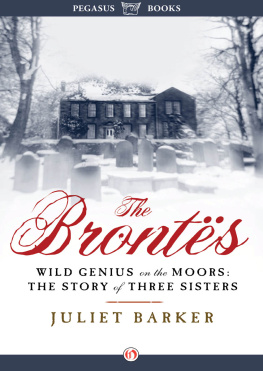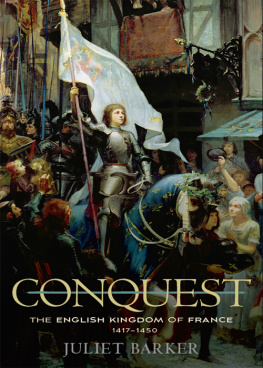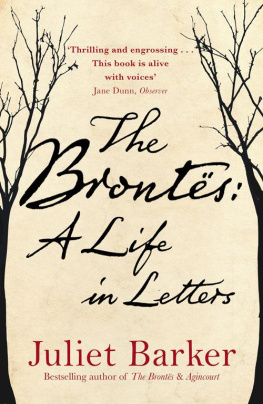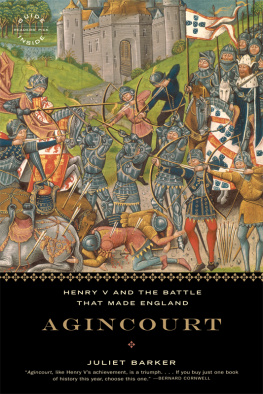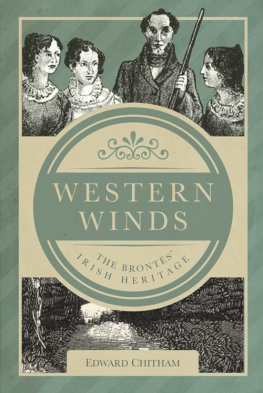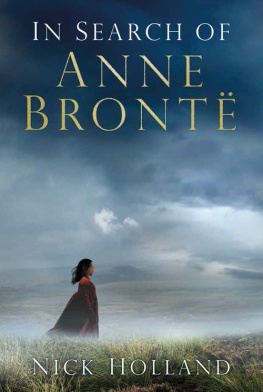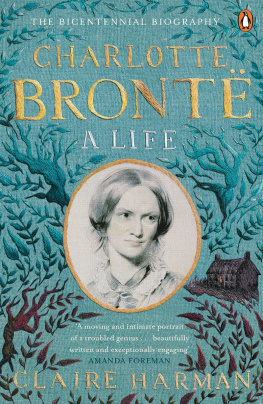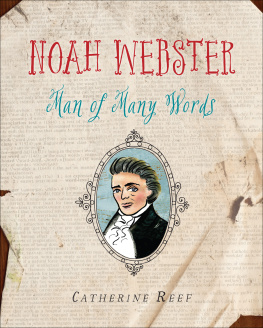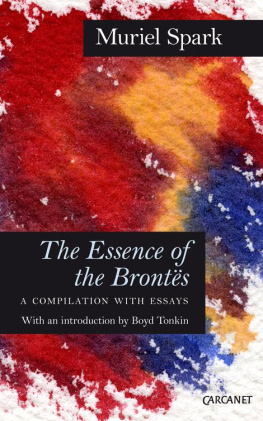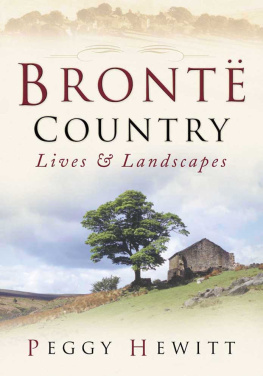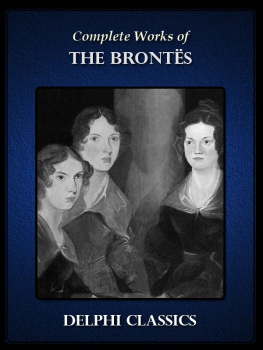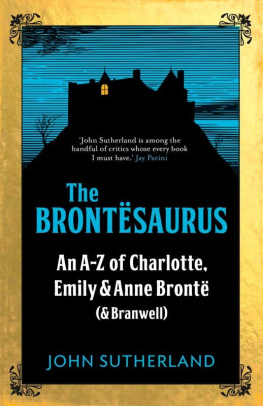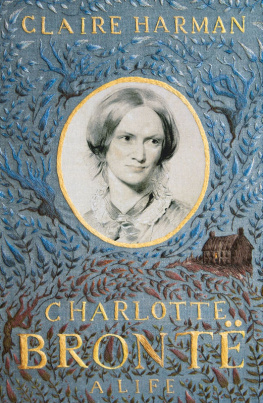T HE
B RONTS
Juliet Barker

PEGASUS BOOKS
NEW YORK LONDON
For James
Edward and Sophie
Juliet Barker is an internationally recognised expert on the Bronts and medieval chivalry. She was born in Yorkshire and has lived within a few miles of Haworth all her life. Educated at Bradford Girls Grammar School and St Annes College, Oxford, where she gained a doctorate in medieval history, she was curator and librarian of the Bront Parsonage Museum at Haworth from 1983 to 1989. Her revolutionary and prize-winning biography The Bronts was the result of eleven years research in archives throughout the world. Her ability to combine ground-breaking scholarly research with a highly readable and accessible style has made her a bestselling literary biographer and medieval historian: her Agincourt was the fourth bestselling history book of 2006. Awarded an Honorary Doctorate by the University of Bradford in 1999 and elected a Fellow of the Royal Society of Literature in 2001, she is married with two children, and still lives in Yorkshire.
For more information, see her website, www.julietbarker.co.uk
An outstanding achievement, a magnificent portrait which not only contains a wealth of important material, but is also a delight to read definitive hard to imagine it ever being surpassed Rebecca Fraser, The Times
A monumental book: patient, thoughtful, sustained and bound to become indispensable Andrew Motion, TLS
A joy to read The Bronts is a magnificent achievement: the finest biography I have read for years Susan Elkin, Literary Review
Quite simply the most astounding and revolutionary book about the Bronts ever written Yorkshire Post
A splendid account of the whole Bront family full of life and sparks Jane Gardam, Spectator
Ruthlessly meticulous revisionist history Hermione Lee, Sunday Times
Powerful there can be no doubt about Juliet Barkers contribution to Bront scholarship Janet Barron, New Statesman
A contribution of enormous value to future generations Lucasta Miller, Independent
Magnificent Val Hennessy, Daily Mail
Also by Juliet Barker
Conquest: The English Kingdom of France 14171450
The Deafening Sound of Silent Tears:
The Story of Caring For Life
Agincourt: The King, The Campaign, The Battle
Wordsworth: A Life in Letters
Wordsworth: A Life
The Bronts: A Life in Letters
The Bronts: Selected Poems
Charlotte Bront: Juvenilia 182935
The Tournament in England, c.11001400
Tournaments: Jousts, Chivalry and
Pageant in the Middle Ages
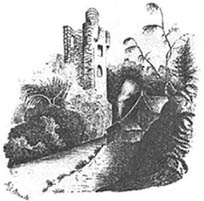
CONTENTS
PREFACE TO THE SECOND EDITION
A new edition of The Bronts is long overdue. It was a revolutionary book when it was first published in 1994 and since then it has become the standard biography of this extraordinary family. Despite this, popular myths about the Bronts have proved astonishingly difficult to quash. It was therefore important to me not only that my biography should remain in print but also that it should be revised and updated so that it could not be undermined by failing to take into account the huge advances in Bront studies which have taken place since 1994.
Two monumental works of meticulous scholarship deserve especial mention: Margaret Smiths The Letters of Charlotte Bront (Oxford, 19952004) and Victor Neufeldts The Works of Patrick Branwell Bront (New York, 19979) provide indispensable tools for the biographer, collecting, re-dating and transcribing manuscripts scattered throughout public and private collections in Great Britain and the United States. I wish they had been available when I was struggling to date Charlottes letters or assemble a coherent narrative from the morass of Branwells juvenilia. Sue Lonoff s The Belgian Essays: Charlotte and Emily Bront (New Haven and London, 1996) and Christine Alexander and Jane Sellarss The Art of the Bronts (Cambridge, 1995) have also broken new ground in publishing material previously only available to researchers in archives. Derek Ropers The Poems of Emily Bront (Oxford, 1995), Heather Glens Charlotte Bront: Tales of Angria (London, 2006) and Dudley Greens The Letters of the Reverend Patrick Bront (Stroud, 2005) all provide useful and accessible editions of the Bronts writings. For the convenience of all readers, new and old, I have changed all my references to these new editions and (occasionally) accepted their new readings.
Much less original material has surfaced since 1994 but this includes important new evidence showing that two of Charlottes drawings were accepted for a public exhibition in Leeds in 1834 and, conversely, proving that Branwell did not attend the Royal Academy in 1835 and that a variety of alternative careers had been considered for him. Charlottes letter describing her wedding dress is a particularly delightful new find, there are piquant details in the Bishop of Ripons description of his hostess at Haworth Parsonage in 1853 and a touching letter to the same bishop from the newly bereaved Patrick, who had just lost his sixth and last child. Additional information, particularly about Haworth and the locality in the Bront era, has emerged and I am grateful, in particular, to Steven Wood, Robin Greenwood and Ian and Catherine Emberson for their corrections and assistance. I am also indebted to members of the Bront Parsonage Museum staff, particularly Sarah Laycock, Polly Salter and Sean Killian, who have all gone out of their way to assist me in preparing this new edition. Finally, I would like to thank my publishers, Little, Brown, for giving The Bronts a new lease of life.
Juliet Barker
February 2010
ACKNOWLEDGEMENTS
Throughout the many years it has taken to complete this book I have naturally incurred many debts. First and foremost amongst these is to my immediate family, my parents, husband and children, who have suffered endlessly (but not always in silence) because of my obsession. Without their practical assistance, encouragement and forbearance, this biography could never have been written. Secondly, I owe a debt I can never repay to Ian Beck, consultant gynaecologist and obstetrician, who saw me through the worst year of my existence. His quite exceptional kindness, good humour and medical skill saved my sanity and my health; his goddaughter, Sophie Jane, owes her life to him. Thirdly, though it is invidious to single out only some of those who have helped me with my research, I would like to make a special mention of Margaret Smith, who read through my entire manuscript and, with her meticulous eye for detail, saved me from an embarrassing number of errors. She also pinpointed the locations of many Bront manuscript holdings which I would not have otherwise found. Sue Lonoff of Harvard University, Professor Victor Neufeldt of the University of Victoria, British Columbia, and Rebecca Fraser all gave extensive assistance and much moral support. Special mention is also due to Diana Chardin of Trinity College, Cambridge, for letting me know about her discovery of transcripts of Branwells letters and to Eileen Maughan of the Cumbria Record Office, Barrow-in-Furness, for undertaking research on my behalf in an effort to identify Branwells illegitimate child.
I am grateful to the staff and governing bodies of the following institutions for assisting me in my research and giving me permission to quote from manuscripts in their care: Beinecke Library, Yale University; Berg Collection, New York Public Library; Birmingham University Library; Bodleian Library, Oxford; Borthwick Institute of Historical Research, York; Boston Public Library, Massachusetts; British Library and British Newspaper Library; British and Foreign Bible Society; British Museums Central Archives; Bront Parsonage Museum, Haworth; Brotherton Collection, University of Leeds; Brown University Library, Rhode Island; Buffalo and Erie County Public Library, New York; Cambridge University Library; Casterton School, Kirkby Lonsdale; Church of England Record Centre; Church Missionary Society; Church Pastoral Aid Society; Columbia University, New York; Cumbria Record Office, Barrow-in-Furness; Cumbria Record Office, Kendal; Ella Strong Denison Library, Scripps College, California; Essex Record Office; Fales Library, New York University; Fitzwilliam Museum, Cambridge; Friends Historical Library of Swarthmore College, Pennsylvania; Guildhall Library, London; Harry Ransom Humanities Research Center, University of Texas at Austin; Historical Society of Pennsylvania; Houghton Library, Harvard University; Huntington Library, San Merino; John Murray (Publishers) Ltd; John Rylands University Library of Manchester; Kings School, Canterbury; Knox College, Illinois; Law Society, London; Leeds City Museum; Leicestershire Record Office; The Library, Morrab Gardens, Penzance; Library and Museum of the United Grand Lodge of England; Maine Historical Society; Manchester Public Library; Margaret Clapp Library, Wellesley College, Massachusetts; National Archive; National Library of Scotland; Pforzheimer Collection, New York Public Library; Pierpont Morgan Library, New York; Princeton University; Quaker Collection, Haverford College, Haverford; Robinson Library, University of Newcastle upon Tyne; Rosenbach Museum and Library, Philadelphia; Royal Academy of Arts, London; St Johns College, Cambridge; Shropshire Record Office; Society for Promoting Christian Knowledge; Staffordshire Record Office; State University of New York at Buffalo; Trinity College Library, Cambridge; Trinity College Library, Dublin; United Society for the Propagation of the Gospel; University College, Durham; University Library, Durham; University Library, Sheffield; University of Illinois at UrbanaChampaign; University of Kentucky, Lexington; University of Rochester, Rochester, New York; West Yorkshire Archive Service at Bradford, Halifax, Huddersfield, Leeds and Wakefield; Whitby Literary and Philosophical Society, Whitby; Woodhouse Grove School, Bradford; Wordsworth Trust, Dove Cottage, Grasmere.

